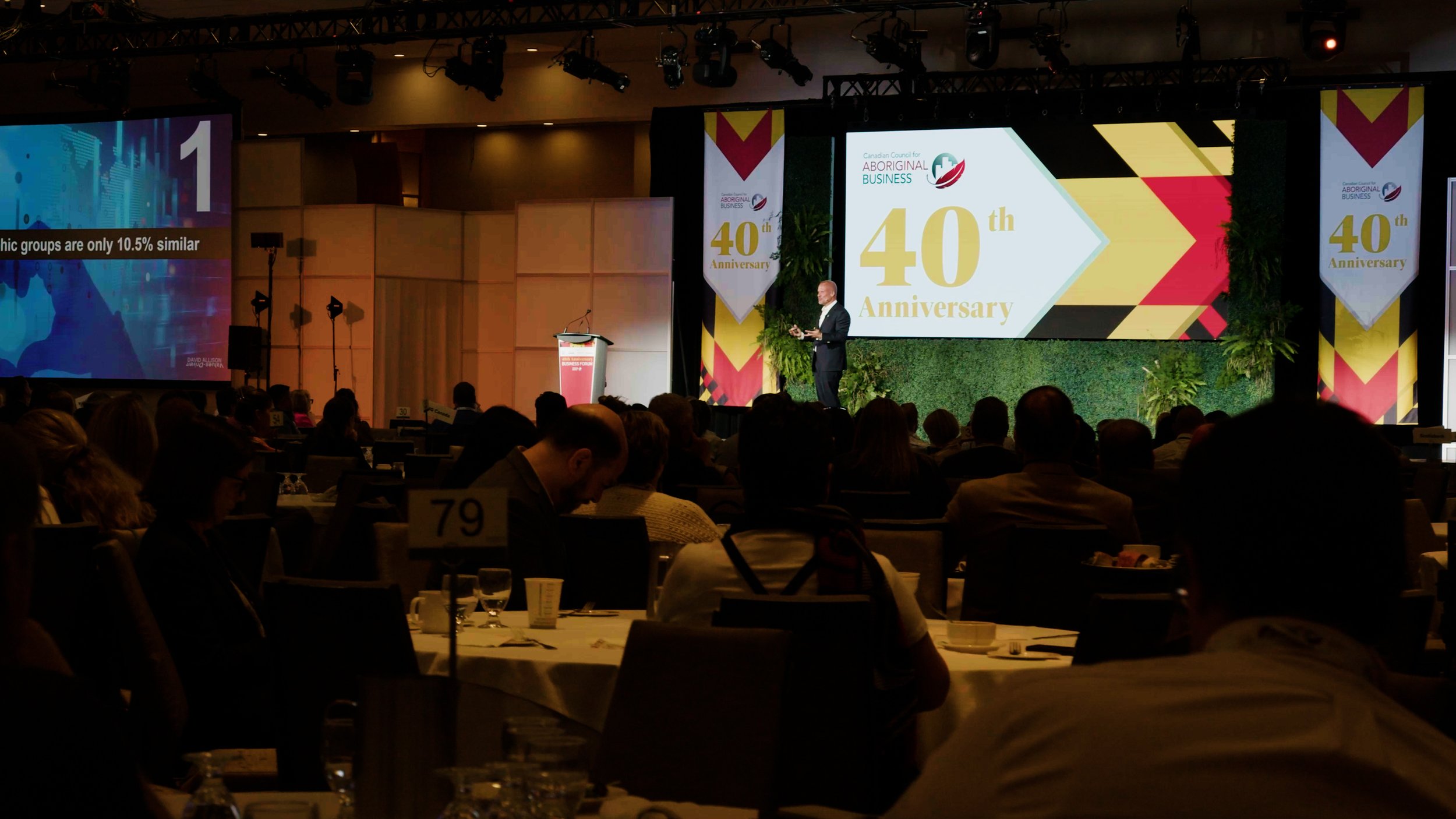Uniting AN INDUSTRY With Shared Human Values
Recently, David Allison spoke at the CCIB 40th Anniversary Conference. He shared insights from the latest valuegraphics study, which profiled Métis, Inuit, and First Nations business owners. This study revealed three unifying core values that can drive a collective success. He wrote this article based on those research findings.
Uniting an industry or sector of the economy can be challenging, in part because it’s difficult to identify what to unite around and what brings all the stakeholders together. Here’s an example of how shared human values are the answer.
Indigenous business owners across Canada face unique challenges and opportunities in today’s world. But as a Métis business owner myself, it’s not immediately clear what unites us. What do we stand for? What are our values? At the CCIB 40th Anniversary conference, I shared insights from a values profile of Métis, Inuit, and First Nations business owners. We found three core values that unite us and can drive our collective success: Relationships, Personal Responsibility, and Loyalty. I call these the Power Values.
This blog post explains how we can use these Power Values to strengthen our businesses and communities.
The Value of Relationships
Relationships are at the heart of Indigenous culture. Our connections with people, especially those we feel a kinship with, are crucial. This value can be a game-changer for Indigenous businesses.
Idea in Action: Traditional Storytelling Strengths
Incorporate storytelling into your business strategy, in expected and unexpected ways. Instead of just promoting products, share stories that highlight the heritage and values behind your business. For instance, if you run a family-owned craft business, tell the story of how traditional methods and designs have been passed down through generations. This not only attracts customers but also creates a deep, emotional connection with them. Consider using a story-based method to onboard new employees and get them up to speed on your best practices. Challenge leadership to use stories to inspire teams and have an award for the best story of the year.
The Value of Personal Responsibility
Indigenous communities have long relied on a system of personal responsibility, where individuals are entrusted with specific roles and tasks. This sense of duty ensures stability and progress within the community, and passes along knowledge in traceable ways. In a business context, this value can help create clear roles, accountability, efficiency, and trust.
Idea in Action: System of Experts
Think about structuring your business so that each team member has a clear area of responsibility, just like the traditional system of experts. For example, if you run a tourism business, ask each person involved in customer experience to be responsible for a certain ritual or area of knowledge in addition to their overall duties. Perhaps there is a traditional herbal tea served as guests arrive, and one person on the team is the expert who sources or harvests the ingredients and prepares the tea in traditional ways, explaining the significance of this act of hospitality as the tea is served. Ask yourself how can this same expert structure be used across all business functions: it not only honors our cultural practices but also ensures that tasks are managed efficiently, contributing to the overall stability of your business.
The Value of Loyalty
Loyalty, based on trust, authority, and respect, is a cornerstone of Indigenous communities. Businesses can leverage this value by creating formal or informal advisory relationships with Elders and community leaders, ensuring that decisions are culturally informed and respected by the community.
Idea in Action: Elder Advisory
Establish an Elder Advisory Council for your business. This can be a formal group or an informal network that provides guidance on business decisions. For instance, if you’re developing a new product or service, consult with the Elder Advisory to ensure it aligns with cultural values and community expectations. Ask for guidance when you have concerns about employee engagement and workplace culture. Listen to what the Elders say about market conditions, supply chain issues, and more: these seemingly modern-day speed bumps and roadblocks are not new. The terminology and specifics may be contemporary, but the issues themselves have been around since time immemorial.
Implementing These Ideas
These ideas are just thought-starters. Every business is unique, and you’ll need to adapt these concepts to fit your specific situation. The key is to always start with the Power Values. Here’s a quick recap on how we identify these values and why they matter so much.
How We Find the Power Values and Why They Matter
We identify the Power Values using an extensive survey process and rigorous statistical analysis based on hundreds of millions of data points in the Valuegraphics Database. By understanding what people value, we can predict their behaviors and decisions with remarkable accuracy. This approach is far more effective than traditional demographic ways of understanding people because it measures and maps the values we use to make all our decisions, every day.
Values drive everything we do. They influence where we live, where we work, and how we interact with the world. By understanding and leveraging shared values, we can create stronger, more resilient businesses and communities.
By embracing our shared values of Relationships, Personal Responsibility, and Loyalty, we can unite and strengthen the Indigenous business community. These values are not just abstract concepts; they are powerful tools that can drive real-world success.
Values are the answer. Let’s put them to work.
#values #keynotespeaker #leadership #belonging #indigenous #employeeengagement #valuesdriven #valuegraphics #humancentric #data

